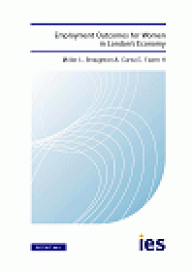Publications
 We author and publish a range of resources to keep you up to date with the latest developments in employment, labour market and human resource policy and practice.
We author and publish a range of resources to keep you up to date with the latest developments in employment, labour market and human resource policy and practice.
All our pdf publications are free to access.
-
📄
Jobcentre Plus and Children's Centres
Dench S, Aston J, James L with Foster R | Mar 2008 | Department for Work and PensionsThe study explored the extent and nature of Jobcentre Plus' involvement in Children's Centres, focusing on the effectiveness of working relationships between stakeholders as well as the experiences of DWP and non-DWP customers using Jobcentre Plus services in Children's Centres.
-
📄
European Social Dialogue and Working Conditions
Broughton A | Mar 2008 | European Foundation for the Improvement of Living and Working ConditionsThis report examines the link between working conditions and social dialogue, highlighting instances where social dialogue has had an impact on working conditions. The impact of social dialogue on working conditions is considered at all levels – national, sectoral, company and workplace levels. There is also a specific focus on occupational health and safety.
-
📄
All Together Now
Group reward strategies
Suff P, Reilly P, Cox A | Mar 2008 | Institute for Employment StudiesThis paper explores the pros and cons of the different types of group reward schemes: starting with individually-focused incentives and team-based rewards, which focus effort on clearly defined goals, and culminating in company-wide profit-sharing and share schemes that reward the combined contribution and cooperation of everyone across the business. It includes real-life examples and key messages which guide readers towards good practice in their operation of group reward systems.
-

Evaluation of Coaching in the NHS
Sinclair A, Fairhurst P, Carter A, Miller L | Mar 2008 | NHS Institute for Innovation and ImprovementThis report explores the effectiveness of the coaching in the NHS. Specifically, it focuses on two elements of the NHS coaching portfolio: internal coaching and the external coaching register. The report examines: the aims and objectives of the coaching - the reasons why coaching was taken up, how objectives were set and what these were; outcomes of the coaching - views from the coachees and coaches on any changes they witnessed during the programme and afterwards, as well as third-party views; barriers to successful achievement of outcomes - the problem areas and barriers that prevented particular aims from being met; and the process of coaching - the coachees and coaches were asked to reflect on the process of coaching and what they had liked or disliked about it. The study also looks at the ways in which coaching is being managed and marketed within the NHS.
-
📄
The Role of Training and Skills Development in Active Labour Market Policies
Meager N | Mar 2008 | Institute for Employment StudiesIn the light of the task of the new UK Commission for Employment and Skills (UKCES) to achieve a greater degree of integration between skills policy and employment policy in the UK, this paper looked at what was known from the extensive international evidence about the role and effectiveness of training and skills interventions as part of a broader portfolio of active labour market policies (ALMP).
-
📄
Helping people understand what coaching really is
Sinclair A, Fairhurst P | Feb 2008 | Institute for Employment StudiesThis paper explores some of the issues in making clear what coaching is and highlights one effective way of improving people's understanding. It draws on IES's coaching evaluation in the NHS to highlight the need for clearer information for staff outside of the executive level about how coaching and mentoring differ, and how each approach may be valued for different reasons and at different times.
-

People and the Bottom Line
Tamkin P, Cowling M, Hunt W | Jan 2008 | Institute for Employment StudiesDoes the way people are treated at work make a difference to the performance of the organisations that employ them? Are there returns to investment in human capital in a similar way to investments in physical capital? These seem straightforward enough questions but they have generated huge amounts of debate. Against this background, this study takes into account concerns from both academics and practitioners, and provides a convincing argument that the investments firms make in their workforce make a difference.
-

Employment Outcomes for Women in London's Economy
Miller L, Broughton A, Carta E, Fearn H | Jan 2008 | Institute for Employment StudiesThis report identifies patterns of difference in equality outcomes between women working in the public and in the private sector in London, to help inform the subsequent development of policies for women in London's economy. The work consists of three strands: analysis of existing datasets to provide evidence of the relative positions of women and men in London's economy; identification of areas of inequality; and identification of examples of employer policies and practice in addressing these areas of inequality. The research also considers: whether there were any significant differences between the positions of women and men employed within the public and private sectors; differences in employment outcomes for women from black and ethnic minority backgrounds and white women; and the situation of women with disabilities within the workforce.
-
📄
Evaluation of the Activity and Learning Agreement Pilot
Process Evaluation: Year One Report
Maguire S, Thompson J (University of Warwick), Hillage J, Dewson S, Miller L, Johnson C, Newton B, Bates P, Page P (IES) | Jan 2008 | Department for Children, Schools and FamiliesThis publication is no longer available. The Activity and Learning Agreements Pilots were launched in April 2006 in 12 areas of England. This report is based on the process strand of the evaluation which used case studies to explore the operational issues and the implementation chain, identifying problems and good practice.
-

Activity and Learning Agreement Pilots - Programme Theory Evaluation (Working Paper 1)
Incentivising Participation in Activity Agreements
Johnson C, Newton B, Usher T, Hillage J | Jan 2008 | Department for Children, Schools and FamiliesThis study investigated the theory that ‘If the net additional value of the incentive was sufficiently appealing, certain young people would sign up to the Activity Agreement (AA), or at least attend an initial discussion where the wider benefits of the AA could be promoted'.
